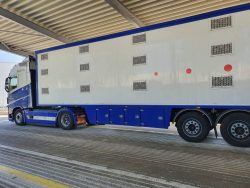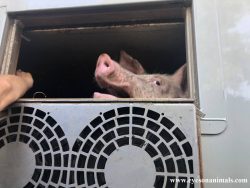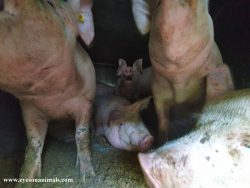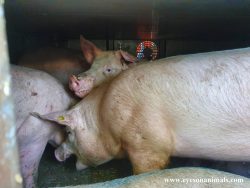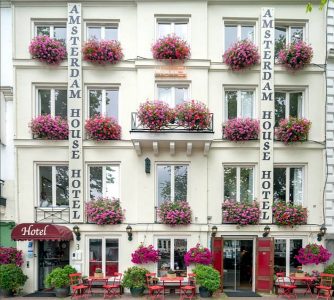Already back in 2013 we alerted authorities across the Netherlands and Europe, as well as industry stakeholders involved in animal transport and slaughter, about the phenomenon of closed livestock trucks growing in numbers among mainly Dutch transporters. These trucks are in violation of the European transport laws as they limit or block all visual inspection of the animals, limit or completely prevent access to the animals and risk the welfare of the animals should temperatures and humidity rise inside. These trucks are not air-conditioned, but only have fans built into the solid walls.
We published a report in 2013 focused on the importance of access to animals on board livestock trucks. Without being able to access animals on board a truck, a driver cannot properly feed, manually water or treat those in need (such as a new-born that accidentally was born on board, or an animal that falls and gets trapped underneath others or injures itself…). We repeatedly saw, during our inspections, animals suffer for hours unnecessarily, some even die, because there was no ability to access them inside the truck and there was no place to unload the animals easily. Sometimes the driver did not even notice until it was too late. We also are getting more and more feedback from chauffeurs that they have trouble controlling the level of heat stress inside closed trucks when they transport animals on hot and humid summer days in them. During our own inspections, especially of Dutch pigs being transported to Dutch slaughterhouses via closed trucks, we also observed how the temperature and humidity inside those trucks were much higher than in conventional trucks. When opening the little inspection peep holes we found pigs breathing very fast, foaming at the mouth, and desperate to put their head outside. Some were completely lame, lying flat out. For this reason we published a report in 2017 about the lacking scientific information or inventory available about these closed trucks and questioned why they are permitted on the roads when too little was known about if they adequately protect animals on hot and humid days. In the summer of 2021 a slaughterhouse confirmed to Eyes on Animals that 16 pigs arrived dead on board a closed truck one day. From another plant we heard that indeed more dead ones arrived on closed trucks that on conventional trucks on tropical warm days.
We also were just seeing and hearing the tip of the iceberg- how many other pigs were arriving dead on hot and humid days that Eyes on Animals did not see or hear about? How many other pigs were arriving alive but had suffered badly from heat stress, whose suffering was completely unrecorded by the stakeholders and authorities? In 2021 we measured the heat and humidity levels inside closed trucks and conventional trucks again, and published our findings and photos to visually illustrate the seriousness of the matter. We also met with one of the manufacturers of the closed trucks, who admitted that no third-party scientific research was conducted that is available for the public, on how these trucks work in a satisfactory way to protect pigs on hot and humid days. Nor have the Dutch authorities forced these trucks to first pass a test to prove that they are adequate. They just showed up on the Dutch market and grew, in an uncontrolled way, in numbers on Dutch roads. No other European country manufacturers or uses such trucks to such an extent, in fact many countries say that they would forbid them. Of most concern is that one of the manufacturers has now adapted its design so that the previously closed truck design is now adjustable, and can be opened again. It can be set to closed, and open, instead of permanently closed.
This in itself shows that during all these years, industry stakeholders themselves became worried about the conditions inside closed trucks, and now want the option to open them up. It is a shame that all these years went by without any real standards or supervision. We met with the NVWA authorities today again to ask that they take this concern seriously and this summer make an inventory to be able to show if there is a link between animals, in particular pigs, arriving at pig slaughterhouses with signs of heat stress, and type of transport vehicle. They informed us that they will consider it in due time for next summer, if their limited time and resources permit it.
